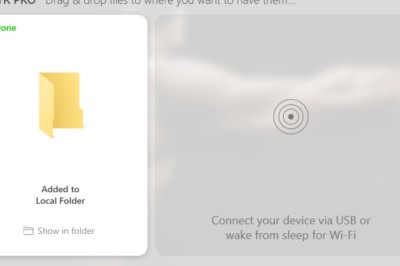views

Source: Pixabay.com
Healthy Habits for Remote Workers: Fitness, Nutrition, and Mental Health
Remote work has become the norm for many professionals, offering flexibility and eliminating long commutes. However, this work style also brings unique challenges to physical and mental well-being. Sedentary habits, easy access to unhealthy snacks, and social isolation can take a toll. Building healthy habits is essential to maintain overall health and productivity. In this article, we’ll explore strategies to boost fitness, nutrition, and mental health for remote workers, and how mentoring can play a surprising role in improving mental health.
1. Prioritize Physical Fitness
One of the biggest challenges remote workers face is reduced movement throughout the day. Sitting for long hours can lead to back pain, stiffness, and a lack of energy. Incorporating fitness into your daily routine is vital.
Simple Ways to Stay Active
● Start with a Morning Stretch: Begin your day with 10–15 minutes of stretching or yoga to energize your body and mind.
● Use Short Breaks Effectively: Stand up and walk around every hour. Apps and smartwatches can remind you to move.
● Invest in a Standing Desk: Alternating between sitting and standing while working can reduce the health risks associated with prolonged sitting.
● Micro Workouts: Try a quick set of push-ups, squats, or jumping jacks during your breaks. These bursts of activity improve circulation and focus.
● Schedule Regular Workouts: Set aside 30 minutes daily for exercise, whether it’s a brisk walk, strength training, or an online fitness class.
Consistency is key to staying fit as a remote worker. Remember, small but consistent efforts yield significant results over time.
2. Maintain Balanced Nutrition
Working from home often means easy access to the refrigerator and pantry, making it tempting to reach for snacks throughout the day. Over time, this can lead to unhealthy eating habits.
Tips for Better Nutrition
● Plan and Prep Meals: Create a weekly meal plan and prepare healthy meals in advance. This reduces the temptation to grab processed foods.
● Keep Healthy Snacks Handy: Stock up on fruits, nuts, yogurt, or granola bars instead of chips or cookies.
● Stay Hydrated: Dehydration can mimic hunger and lead to overeating. Keep a water bottle nearby and aim for 8–10 glasses daily.
● Avoid Mindless Eating: Designate a dining space and avoid eating at your desk. This helps you focus on your food and prevents overeating.
● Limit Caffeine and Sugar: Too much caffeine or sugary snacks can cause energy crashes and affect focus. Opt for green tea or herbal teas as alternatives.
A balanced diet fuels your brain and body, keeping you energized and focused throughout your workday.
3. Cultivate Mental Well-being
Remote work can lead to feelings of isolation, blurred boundaries between work and personal life, and stress from constant connectivity. Mental health is just as important as physical health for remote workers.
Strategies to Support Mental Health
● Set Boundaries: Clearly define your working hours and avoid overworking. Communicate these boundaries with your team.
● Create a Dedicated Workspace: Designate a quiet and comfortable area as your workspace to separate work from relaxation.
● Practice Mindfulness: Techniques like meditation or deep-breathing exercises can help manage stress and improve focus. Apps like Calm and Headspace are great tools.
● Stay Social: Make an effort to connect with colleagues, friends, or family through video calls, chats, or virtual coffee breaks. Social interaction combats loneliness.
● Take Time Off: Schedule regular breaks and use your vacation days to recharge. Stepping away from work helps prevent burnout.
The Role of Mentoring in Mental Health
According to research, mentoring can reduce anxiety and improve mental health for both mentors and mentees, offering valuable support in remote work settings. A mentoring relationship provides guidance, encouragement, and a sense of connection, which is critical in an isolated work environment.
For mentors, sharing knowledge and supporting someone else’s growth fosters a sense of purpose and satisfaction. For mentees, having someone to lean on and learn from reduces stress and builds confidence. Companies can establish formal mentorship programs or encourage informal mentoring relationships among employees to reap these benefits.
4. Combine Fitness, Nutrition, and Mental Health for Holistic Well-being
Balancing these three aspects of health can enhance your overall productivity and happiness. Here’s how to integrate them into a cohesive routine:
● Morning Ritual: Begin the day with light exercise, a healthy breakfast, and a few minutes of mindfulness.
● Midday Check-In: Use lunch breaks to enjoy a nutritious meal, take a short walk, and connect with a colleague or friend.
● Evening Wind-Down: Reflect on the day with gratitude journaling, light stretching, and setting goals for tomorrow.
5. Leverage Technology to Stay on Track
Technology can be a powerful ally in maintaining healthy habits. Consider using:
● Fitness Apps: Track workouts and set goals with apps like MyFitnessPal or Fitbit.
● Meal Planning Tools: Apps like Mealime or Yummly make healthy meal prep easier.
● Meditation Apps: Calm, Insight Timer, or Headspace can help reduce stress and improve sleep quality.
● Workplace Tools: Platforms like Slack or Zoom for virtual social interactions and collaboration.
6. Advocate for Organizational Support
Employers play a crucial role in supporting the health of remote workers. Organizations can foster wellness by:
● Offering virtual fitness or wellness programs.
● Providing resources for mental health, such as counseling or stress management webinars.
● Encouraging team bonding through virtual meetups or mentoring programs.
● Promoting work-life balance by discouraging after-hours communication.
When companies prioritize the well-being of remote workers, it creates a culture of trust and respect, boosting morale and productivity.
7. Track Your Progress
Lastly, evaluate how your efforts are impacting your health and work performance. Regularly check in with yourself by asking:
● Are you feeling more energized?
● Are you eating better and staying active?
● Are you experiencing less stress or anxiety?
Adjust your habits based on your needs and continue striving for balance.
Conclusion
Remote work offers undeniable perks, but it requires intentional effort to maintain health and well-being. By incorporating fitness, balanced nutrition, and mental health practices into your routine, you can thrive both personally and professionally. Mentoring can add an extra layer of support, reducing anxiety and fostering connections in a remote work setting.
Remember, small daily changes lead to lasting improvements. Prioritize your health, and you’ll be better equipped to navigate the challenges of remote work while enjoying its benefits.
























Comments
0 comment